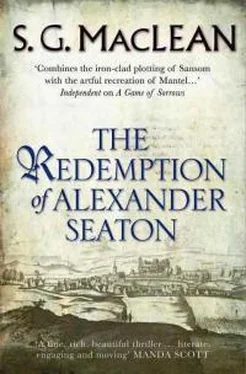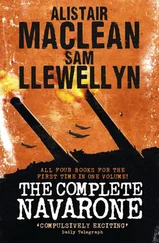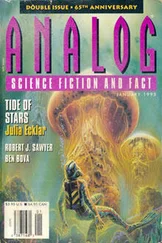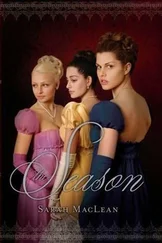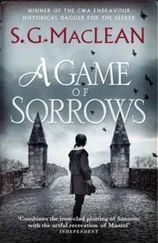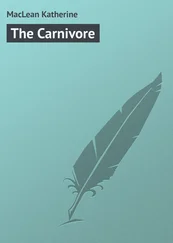The baillie was in little doubt. ‘The French – long a godless people and ever the enemy of Scotland. France would have had us in her snare sixty years ago, when we had scarce yet freed ourselves from thraldom to Rome. The late king’s mother was but a pawn in their schemes. It grieves me greatly that her grandson should have fallen in with yet another French marriage, for no good will come of it.’ King Charles had only succeeded a year ago, yet within two months he had married himself a French bride. This ‘dabbling with Rome’ had made many uneasy, myself included.
The provost turned to Thomas Stewart. ‘You think Spain the more likely foe. What is your reasoning?’
The notary pushed one of the maps across the table to the provost. ‘We are agreed that a substantial landing force could be disembarked here or here?’ The provost nodded, and the notary traced a line with his finger slightly north and eastwards of the sea at Banff. ‘Any invasionary fleet would be most likely to come in here. A journey up the west of Scotland and around Cape Wrath or even the Orkneys would be fraught with navigational perils and could not hope to escape detection for long enough to surprise us. But that is the way the French would have to come, for they could scarce sail up the English Channel and hope to progress up the eastern coastline of England without attracting notice. But think of the Spaniards. Think of the Netherlands.’ What he said was true; since the revolt of the Dutch twenty years ago, Spain no longer held the northern Netherlands, gathered now into a republic under the auspices of their States-General. But they still held the south, and soldiers and ducats flowed from Madrid to Antwerp and Brussels, sustaining a network of Spanish spies and intrigue on a seemingly limitless supply of gold from the Americas. Perhaps Patrick Davidson had simply been one more cog in the great Spanish wheel that drove the Habsburgs’ will through Europe and beyond.
The provost began to nod his head slowly, evidently thinking the thing out for himself. ‘A fleet – armada they call it? – could set sail from Flanders and possibly avoid detection sailing north. A favourable wind would bring them to our shores in little enough time. But why here? Why so far north?’
The minister could hold his tongue no longer. ‘In God’s name, do we tremble to say it? There is not one among us who does not suspect the hand of Huntly in all of this.’
Walter Watt would have restrained him. ‘Have a care–’ but for once the minister would not be cowed by his brother-in-law.
‘No, provost, I will not. How long must we live in fear of the papist Gordon backsliders, who would sell our nation into Roman whoredom for the price of a mass?’ What he said was true. It was common knowledge that the Gordons had never accepted the Reformation of religion in our country, and were ever striving for a return to Rome. They did not blanch at treachery or civil war in their efforts. And now, with the king in England and the whole continent of Europe at war, might they not well intrigue with Spain as they had done before? The provost addressed me.
‘And have you anything to add, Mr Seaton? How seems the Spanish answer to you?’
I worded my reply with caution. ‘I believe that if our country is to suffer an assault from the Spaniard, it will be because the king himself has brought them to it.’ These were dangerous words, I knew. Dangerous words to use in the company of men with no reason to wish me well. The provost, whom I did not like but was coming to believe I could trust, spoke first.
‘On what grounds do you hold this view?’
‘On the grounds that are known to us all: that after his accession, King Charles lost little time in abandoning his father’s policy and showing himself the enemy of Spain. England will always be the prize for Spain, but they might reason soundly that much might be achieved in England by striking our king first in his Scottish kingdom, and where else would the Spaniards find so firm and well-placed a friend as the Marquis of Huntly?’
Thomas Stewart seemed somewhat ill at ease. ‘I feel we are all of one agreement: that if our nation is under threat from a foreign force, then that force will come from Spain, and that if Patrick Davidson was spying for anyone, it was at the behest of Madrid. And yet–’
‘And yet,’ interrupted the provost, ‘we have no proof whatsoever that my nephew was engaged on any such activity; these maps may be the fruits of a blameless pursuit.’
I felt somewhat as a fly might do when led into a trap by a spider. The provost had allowed us to entangle ourselves more and more in a web of speculation of our own making, and now he was ready to pounce upon us in his dead nephew’s defence. I felt that I was as responsible as anyone, in my failure to speak up for him when Gilbert Grant had asked me to.
‘I am no expert in these maps, provost, and I have no interest in calumniating an innocent man.’
The baillie was swift. ‘Even to save your friend?’
‘Even for that.’
He nodded. ‘Good. It is as I thought.’
I did not know what to make of the baillie’s words, but I had little time to pursue the enquiry in my mind. Thomas Stewart eyed me levelly. ‘Whatever we do will not be lain at your door, Alexander; you have done no more than we asked of you, and that well, yet I believe we should not proceed further in this matter without first taking further counsel.’
The minister was wearied of listening to the views of others when his own were so clear to him. ‘And to what reprobate must we now turn before we may proceed as any group of godly and honest magistrates?’
The slur on me was let pass as the notary responded in a steady voice. ‘Robert Gordon of Straloch.’
The minister snorted derisively and the baillie rose from his seat in some alarm. ‘The risk is too great.’
‘Straloch is no papist,’ asserted the notary.
The Reverend Guild snorted again. ‘No papist? He is a Gordon! They drink in incense with their mother’s milk.’
The notary repeated himself, an edge to his voice being sharpened by his growing impatience. ‘Robert Gordon of Straloch is no papist. He is a Justice of the Peace and one of the best-respected men in the kingdom. The king himself does not scruple to seek his counsel.’
‘Aye,’ retorted the minister, ‘and Huntly does not blow his nose without consulting him first.’
‘Perhaps so. But many’s the time it has been the restraining hand, the measured counsel of Straloch, which has held the Marquis back, when his own impetuous nature would have precipitated us all into disaster.’
When the baillie spoke his words were slow and deliberate. ‘And what say you, provost? Should we consult Robert Gordon of Straloch on the matter of these maps?’ He was watching the provost closely, as if hoping something in the man’s reaction would reveal complicity or innocence in his nephew’s doings.
It was a moment before Walter Watt began his reply, and as he spoke, I understood what it was that had set him apart from his peers. Walter Watt, when he chose, could speak and reason with a degree of authority that silenced other men. ‘I too am uneasy about approaching so close to the centre of Gordon power on a matter so potentially dangerous for us all. Nevertheless, we cannot proceed on an investigation relating to these maps without expert opinion of their nature. It is known that there is not a man in the whole of Scotland who has a greater understanding than Straloch of the art of cartography. That he is a Gordon and a confidant of the marquis cannot be denied, but what the notary says is true. He is respected as much as any man, and may of times have been the one voice that counselled against catastrophe. We should consult Straloch. We should ask him for his opinion on the basis of one map – only one. For if my nephew had fallen into such a blasphemous treachery as he may have done, I am resolved that these papers should burn to ashes and never another eye look on them.’
Читать дальше
